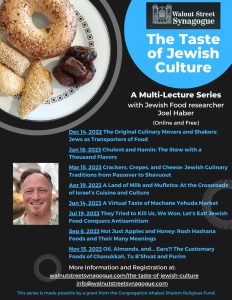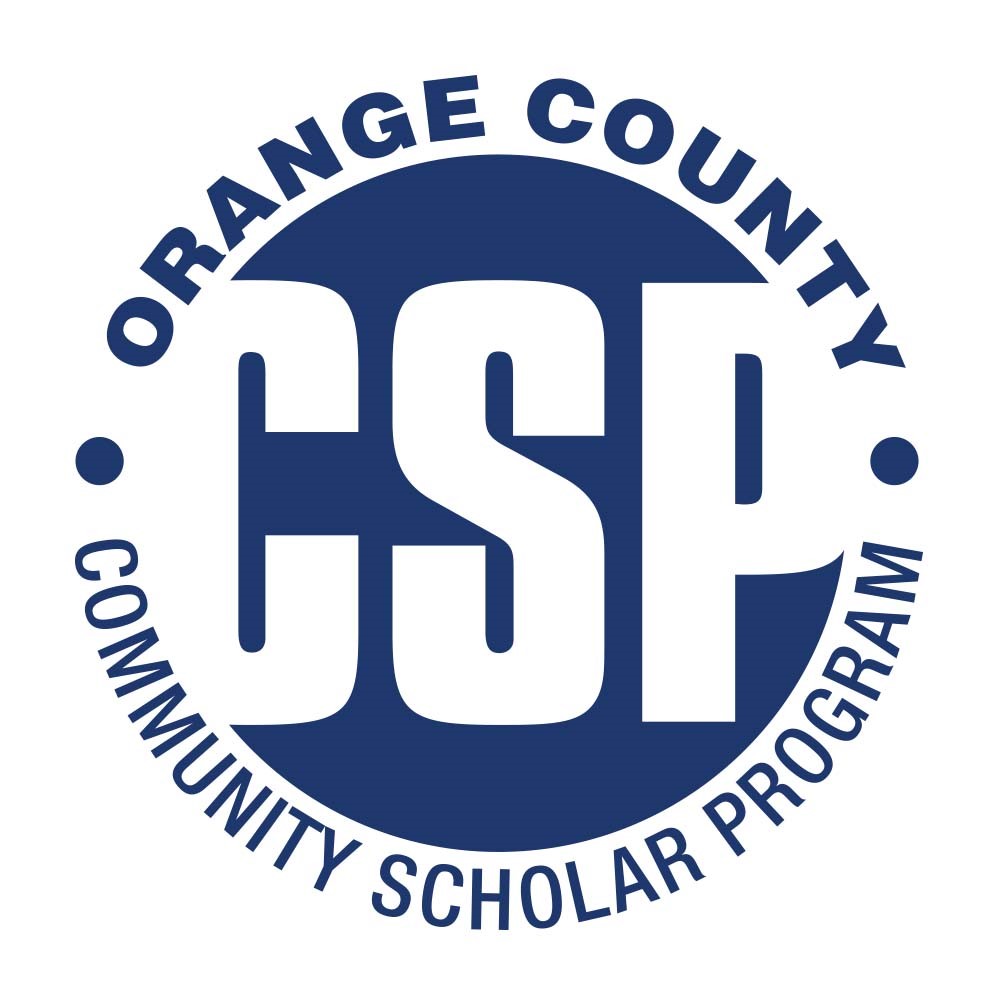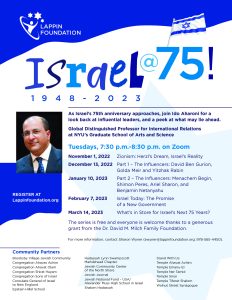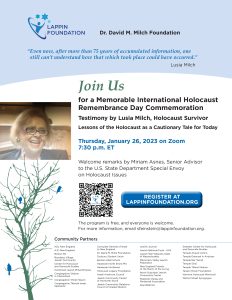JOIN OUR MAILING LIST
JANUARY 2023 PROGRAMS
THE TASTE OF JEWISH CULTURE

The Walnut Street Synagogue is pleased to present The Taste of Jewish Culture series. Join us for our second program, Chulent and Hamin: The Stew with a Thousand Flavors, on Wednesday, January 18 at 7:00 pm EST.
Please visit our event webpage for more details and to register.
The Taste of Jewish Culture details
CSP
The Walnut Street Synagogue is pleased to be a partner congregation of the Orange County Jewish Community Scholar Program. Please join us at an upcoming program!

The Radical Responsibility of Rabbi Sacks: The Problem of Evil as a call to Action
Tuesday, January 31, 1:00 pm EST
(online in partnership with the Orange County Jewish Community Scholar Program)
How do we manage the dissonance between the world as it is and the world as it ought to be? This question has haunted mankind since its inception and is the driving force behind our constant desire to understand why evil and suffering exist in the world. In this class we will be exploring this perennial human dilemma through the prism of Rabbi Sack’s iconic book Radical Then Radical Now. Through studying both Biblical and Midrashic sources as well as contemporary Jewish thought we will provide a radical re-reading of the issue that will aim to provide an innovative and paradigm shifting approach to the subject.
Dr. Tanya White is an international lecturer, writer and educator with a focus on Tanach and Contemporary Jewish Thought. She is a Senior lecturer at Matan Women’s Institute for Torah Studies and gives weekly classes in other institutions including Pardes and LSJS. Tanya brings her Torah to audiences in Israel and abroad acting as scholar in residence to diverse communities in the US, Switzerland and the UK. She is a graduate of the Matan Hasharon Scholars program and holds a BSc from LSE in International Relations and an MA in Jewish studies and philosophy from LSJS and SOAS London. She holds a doctorate in Jewish Philosophy from Bar Ilan University, and is the recipient of Schupf Fellowship for outstanding students. Tanya is driven by a passion to exchange insights on the most pressing topics facing the modern Jewish world and has published numerous articles in books and social media, including a highly publicized responsa with Rabbi Nathan Lopez Cardozo which was subsequently published in his book Jewish Law as Rebellion. Tanya is the mother of four daughters and lives with her husband and family on a Moshav in central Israel.
Demystifying History
Part 1 – A Tale of Two Popes: Pope Pius XII and John Paul II – Sunday, January 8, 7:00 pm EST
Part 2 – FDR and the Holocaust – Sunday, January 15, 7:00 pm EST
Part 3 – Our People are Your People: American Jews and the Struggle for Civil Rights – Sunday, January 22, 7:00 pm EST
Part 4 – Putin, Ukraine and the Jews – Sunday, January 29, 7:00 pm EST
(online in partnership with the Orange County Jewish Community Scholar Program)
Part 1 – A Tale of Two Popes: Pope Pius XII and John Paul I – Two brilliant men faced different and difficult times. One by the sin of omission dishonored his church. The other changed history and transformed Jewish Catholic relations
Part 2 – FDR and the Holocaust – He was the greatest president of the twentieth century, a magnificent leader during the Depression and in the war. But when it came to the Jews he failed.
Part 3 – Our People are Your People: American Jews and the Struggle for Civil Rights – Jewish involvement in the Civil Rights movement is perhaps the most glorious moment in American Jewish history. Yet even in the midst of close collaboration there was the beginning of tension that continues up to the present.
Part 4 – Putin, Ukraine and the Jews – Personality counts in history. The former KGB man rolled the dice. We shall see how they come up. His future and the future of Europe hang in the balance.
Stephen M. Berk, who served as CSP’s 10th Annual One Month Scholar in Residence in February 2011, is Professor of History at Union College in Schenectady, New York, former Chair of the Department of History, Director of the Program in Russian and Eastern European Studies and Faculty Advisor to the Jewish Student Organization. He is the author of Year of Crisis, Year of Hope: Russian Jewry and the Pogroms of 1881-1882 (Greenwood Press, 1985). He is currently writing a book titled: ”Our People Are Your People: American Jewry and the Struggle for Civil Rights 1954-1965.” The book provides an interesting discussion of an extremely important chapter in the history of the civil rights movement and attempts to dispel the myths and misunderstandings surrounding the Black-Jewish relationship. A recipient of the Citizens Laureate Award of the University of Albany Foundation, Professor Berk has been a consultant to the Wiesenthal Holocaust Center in Los Angeles, has written articles on Russian and Jewish history, anti-Semitism, and the Middle East and has lectured on throughout the United States and Canada including such distinguished colleges and universities as Princeton, Vanderbilt, The University of Texas at Austin and Williams College.
Program video – Part 1
Program video – Part 2
Program video – Part 3
Program video – Part 4
History & Philosophy of Islam
Part 1 – Jahiliyyah – Arabia before Islam – Thursday, January 5, 1:00 pm EST
Part 2 – Muhammad and His Visions – Thursday, January 12, 1:00 pm EST
Part 3 – Aisha, Fatima and the Sunni-Shia Split – Thursday, January 19, 1:00 pm EST
Part 4 – The Hajj – The Pilgrimage to End All Pilgrimages – Thursday, January 26, 1:00 pm EST
(online in partnership with the Orange County Jewish Community Scholar Program)
Part 1 – Jahiliyyah – Arabia before Islam – What was Arabia like before Muhammad had his visions? Who were the tribes that comprised this world? What were the main systems of knowledge, economics and politics? Join us as we dive into the “Age of Ignorance” – the time before the Prophet arrived.
Part 2 – Muhammad and His Visions – Who was Muhammad? How did he come to unify the Arab world? How does one person’s vision and code of ethics and morality unify a people? What was Muhamad’s major unifying message? What was the attraction that eventually caused so many to convert?
Part 3 – Aisha, Fatima and the Sunni-Shia Split – What was the role of women in general in the rise of Islam? We will ‘meet” Aisha and Fatima and other powerful women surrounding Muhammad and then explore the redirection of Islam into a dynastic system.
Part 4 – The Hajj – The Pilgrimage to End All Pilgrimages – Join us as we delve into the origins of the Hajj ritual, the place it takes within Islamic culture and the surprising connections between the Hajj and the Chagim.
Dr. David Mendelsohn supervises the entire academic program of the Kivunim Institute. His areas of expertise include Islamic Studies, History and Culture of Arabs with Israeli Citizenship, Bedouin Law and the relationship between language and culture in Arabic and Hebrew. His current research examines the influence of Hebrew on the dialects of Arabic spoken in Israel. Mendelsohn also lectures on the history and relationships between Middle East countries and militant organizations. David holds advanced degrees in diverse fields: a Ph.D. Classics / Linguistics, an M.A. in Archaeology / Linguistics and an Honours B.A. in Classical Studies. David is the recipient of one of Canada’s highest academic honors, The Trudeau Prize and a world class Judo Gold Medal winner. He lives in Jerusalem with his wife Roni and 3 children. This program is fully funded by a grant from the Jewish Community Foundation Orange County
A Visit to the Heart of the Ancient Silk Road: The Jews of Uzbekistan
Tuesday, January 17, 3:30 pm EST
(online in partnership with the Orange County Jewish Community Scholar Program)
Uzbekistan, a landlocked country in Central Asia south and southeast of the Aral Sea (bordered by Kazakhstan in the west and north east, by Turkmenistan in the south west, Afghanistan in the south, and Tajikistan and Kyrgyzstan in the east), is the most populous country in Central Asia and is rich in history, culture, and diversity. It has been a part of numerous empires and was once the main centerof the Silk Road. The meaning of the name Uzbek is disputed. One version is that it is derived from Turkish ‘uz/öz’ (‘good’ or ‘true’) and ‘bek’ (‘guardian’). Unlike the neighboring Kazakhs and Kyrgyz, but like their close cousins the Uyghurs, the Uzbeks were mostly a sedentary people, building impressive cities along the old Silk Road. According to tradition, the oldest of Uzbekistan’s Jewish communities, that in Bukhara, was established more than 2,000 years ago following the Babylonian destruction of the First Temple. Other accounts tell of Jews fleeing Persian persecution more than 1,500 years ago and yet others bring Jews to Uzbekistan as merchants on the Silk Road in the seventh century. By any account, Jews in Uzbekistan have a long history. Most were artisans and merchants since land ownership was forbidden. And, like most other Uzbeks, they rode out the tumultuous history of the region, marked by invasions by Alexander the Great, Genghis Khan, the Sardians, the Qarakhanids, the Seljuks, the Persians, the Turks, and the Chinese, all who ravaged Central Asia.
Evgenia Kempinski is a Russian Jew born and raised in St. Petersburg. Her family was originally from the Pale of Settlement – Poland, Ukraine and Belorussia – and endured the suppression of Judaism in the Soviet Union then the rebirth of Jewish culture and religious life in today’s St. Petersburg. She has been an official St. Petersburg tour guide for over 15 years and is the founder and owner of St. Petersburg Jewish Tours – a company offering Jewish travelers a unique experience of showcasing the best of Russia from a Jewish point of view. She currently lives in Haifa, Israel, still keeping close connections with St. Petersburg and its Jewish community.
Understanding Arab Culture – Understanding Ourselves
Tuesday, January 3, 3:30 pm EST
(online in partnership with the Orange County Jewish Community Scholar Program)
Within a century of the death of Muhammad, in 632 CE, Muslim armies had conquered almost the whole of the world where Jews lived, from Spain eastward across North Africa and the Middle East as far as the eastern frontier of Iran and beyond. Almost all the Jews in the world were now ruled by Islam. This new situation transformed Jewish existence. Fortunes changed in legal, demographic, social, religious, political, geographical, economic, linguistic and cultural terms. Along with legal near-equality came social and economic equality. Jews were not confined to ghettos, either literally or in terms of economic activity. The societies of Islam were, in effect, open societies. In religious terms, as well, Jews enjoyed virtually full freedom. Jews adopted the language of the Muslim Arabs such that by the early 10th century, only 300 years after the conquests, Sa’adya Gaon was translating the Bible into Arabic. By the year 900 CE, the Jews had largely abandoned other languages and taken on Arabic. The change of language in its turn brought Jews into direct contact with broader cultural developments. The result from the 10th century on was a striking pairing of two cultures. The Jews of the Islamic world developed an entirely new culture, which differed from Jewish culture before Islam in terms of language, theology, philosophy and worldview. In order to truly understand Judaism as we know it today, therefore, we need to understand Arab culture.
Dr. David Mendelsohn supervises the entire academic program of the Kivunim Institute. His areas of expertise include Islamic Studies, History and Culture of Arabs with Israeli Citizenship, Bedouin Law and the relationship between language and culture in Arabic and Hebrew. His current research examines the influence of Hebrew on the dialects of Arabic spoken in Israel. Mendelsohn also lectures on the history and relationships between Middle East countries and militant organizations. David holds advanced degrees in diverse fields: a Ph.D. Classics / Linguistics, an M.A. in Archaeology / Linguistics and an Honours B.A. in Classical Studies. David is the recipient of one of Canada’s highest academic honors, The Trudeau Prize and a world class Judo Gold Medal winner. He lives in Jerusalem with his wife Roni and 3 children. This program is fully funded by a grant from the Jewish Community Foundation Orange County
Program video
COMMUNITY PROGRAMS
Israel at 75
Part 3 – The Influencers: Menachem Begin, Shimon Peres, Ariel Sharon, and Benjamin Netanyahu – Tuesday, January 10, 7:30 pm EST
Part 4 – Israel Today: The Promise of a New Government – Tuesday, February 7, 7:30 pm EST
Part 5 – What’s in Store for Israel’s Next 75 Years? – Tuesday, March 14, 7:30 pm EDT
(online series presented by the Lappin Foundation)

The Walnut Street Synagogue is pleased to be a community partner of the Israel at 75 series, presented by the Lappin Foundation. In advance of Israel’s 75th anniversary, Ido Aharoni, Global Distinguished Professor for International Relations
at NYU’s Graduate School of Arts and Science, will look back at influential leaders and take a peek at what may lie ahead. Everyone is welcome thanks to a generous grant from the Dr. David M. Milch Family Foundation.
Israel at 75 (Event flyer)
International Holocaust Remembrance Day Commemoration
Thursday, January 26, 7:30 pm EST
(online program presented by the Lappin Foundation)

The Walnut Street Synagogue is pleased to be a co-sponsor of the International Holocaust Remembrance Day Commemoration, presented by the Lappin Foundation. We will hear testimony by Holocaust survivor Lusia Milch on the topic “Lessons of the Holocaust as a Cautionary Tale for Today.” Welcome remarks will be provided by Miriam Asnes, Senior Advisor to the U.S. State Department Special Envoy on Holocaust Issues.
International Holocaust Remembrance Day Commemoration (Event flyer)
Register here
YAD CHESSED

Yad Chessed helps Jewish individuals and families who struggle with financial hardship pay their bills and buy food. As a social services agency rooted in the Jewish values of kindness (chessed) and charity (tzedakah), they are committed to helping those in need navigate a path toward financial stability while preserving their privacy and dignity. They provide emergency financial assistance, grocery gift cards and compassionate advice for those trying to make ends meet. Hundreds of families and individuals throughout the state rely on Yad Chessed to provide for their essentials, and even at times, a Jewish burial for a loved one. Members of our community, as well as others in the Jewish community, who need assistance may contact Yad Chessed by phone at 781-487-2693 or by Email at intake@yadchessed.org for a confidential conversation. Questions can be directed to info@yadchessed.org.
Support Yad Chessed
COMMUNITY PROJECTS
CJP Plan to Combat Antisemitism
Combined Jewish Philanthropies (CJP) has developed a five-point plan to combat rising antisemitism in Massachusetts. They are seeking stories for their mobilization campaign to fight back. If you have experienced antisemitism in any form at any time, join them and say enough is enough! Stories can be of any length and can be submitted anonymously.
Learn more and submit your story
